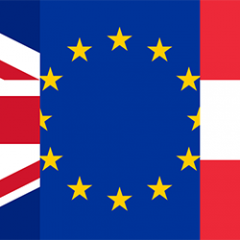I think you will spend 263 seconds reading this post
Having had a foreign currency mortgage, denominated in Swiss Franc, taken out on a property bought in Euro here in Austria, since Swiss Franc mortgages were a popular instrument prior to the Financial Crisis, I’ve seen the destructive effect that a currency devaluation can have for borrowers. The effects of a Brexit could be similar for Brits abroad who are using their Sterling savings to keep afloat in the Euro area. Regardless of whether financing of property is involved, the effects of a Brexit are likely to cause considerable volatility for Sterling.
Possibly a comparison between the Swiss Franc and Sterling might seem hard to justify – but while the circumstances might not be the same, the effects of a “devaluation” can be shown quite nicely based on the scenarios that have unfolded with the Swiss Franc in the last 15 years.
Back in 2003, EUR 1 was worth roughly CHF 1.55. At its pre-Crisis zenith the rate was around CHF 1.66 to the euro. Today, since the artificial floor/cap at CHF 1.20 was removed by the SNB in January 2015, it is at about CHF 1.08 to the euro. Prior to the introduction of the floor/cap in September 2011, the euro was also at near parity with the Swiss Franc.
To put this development into concrete terms, imagine the effects of having taken a mortgage out in 2003, for a 20 year term, for EUR 100,000 in its Swiss Franc equivalent. To simplify things, I’ve ignored the changing interest rates and explaining the idiosyncracies of the Tilgungsträger repayment vehicle (which sometimes leaves a nasty surprise at the end) and just focussed on the exchange rate effect, and ignored the effects of inflation. The only thing to bear in mind is that the outstanding amount loan is in Swiss Franc.
2003: Conversion of EUR 100,000 into CHF at CHF 1.55 / EUR 1.00 meaning the initial outstanding amount is now CHF 155,000, repayable in 240 instalments (i.e. CHF 645.83 paid back at EUR 416.67 per month excluding the costs of the conversion of the amount). Provided the exchange rate stays the same, it sounds all quite reasonable. If the exchange rate increases, then repaying EUR 416.67 will diminish the amount in CHF more quickly.
However, when the euro tanked to near parity in 2011, suddenly the EUR 416.67 repayment was leaving a shortfall of around CHF 220 per month, leaving only the option to increase the repayments to take this into consideration or to have to make an additional final instalment upon maturity to make up the shortfall. Had a cap/floor not been introduced by the SNB in 2011, the borrower would have had to up their payments to nearly EUR 700 per month to pay back CHF 730 instalments monthly for the remaining 12 years. providing the exchange rate did not change until maturity.
Just as the borrower in a foreign currency mortgage is affected in the case above, the situation can also be transposed to the plight of a pensioner wanting to spend their twilight years in the sunshine. Imagine the pensioner who left the UK with Sterling at around EUR 1.50 to the pound, and their pension was continued to be paid out in Sterling, albeit they physically spend it in Euro. Imagine that a pensioner had GBP 100 per week pension – per month that would come to GBP 433 (based on a month being 4.33 weeks) or EUR 650 per month.
Sterling also plummeted against the Euro during the Global Financial Crisis where the pound sank to near parity with the euro. Pensions also stagnated, and even now where Sterling is now at a “healthier” EUR 1.27, only 3 months ago, it was some 10% higher. At the current rate, their pension is EUR 100 less a month. A Brexit could easily see a practically instantaneous 10-15% fall, leaving pensioners at the breadline – at EUR 1.10 per pound, the monthly pension would be about EUR 480 per month – with the prospects of a considerable recovery far from certain.
Transpose the situation for pensioners again to Vienna, where rents and the cost of living is rising steadily and British citizens could be forced to repatriate back to the UK to live with family to make ends meet in the event of a Brexit – a likely consequence for the financially vulnerable if suddenly the carpet is pulled out from underneath them again.
Almost a decade after the start of the Great Financial Crisis sterling has not fully recovered to its pre-crisis rates. A Brexit could provide another setback. A weaker pound may stimulate exports, but at the same time, by being outside the EU, a lot of the advantages of being in a Common Market with waived tariffs would be negated.
So why the mention of the Swiss Franc mortgage earlier? That might seem an slight “apples and pears” comparison – but the point is more to show the dramatic affects of how the status quo was interrupted, considering that in the mid-noughties the Swiss Franc mortgage was part of the furniture in Austria – in a similar way to being part of the EU for the pensioners settling in the sun in their twilight years, or British citizens abroad.
Many of those who had Swiss Franc mortgages, having been forced to convert to remove the risk, are still paying the cost of doing so. The cost of a Brexit for British citizens abroad could be similarly difficult to stomach and bear.
